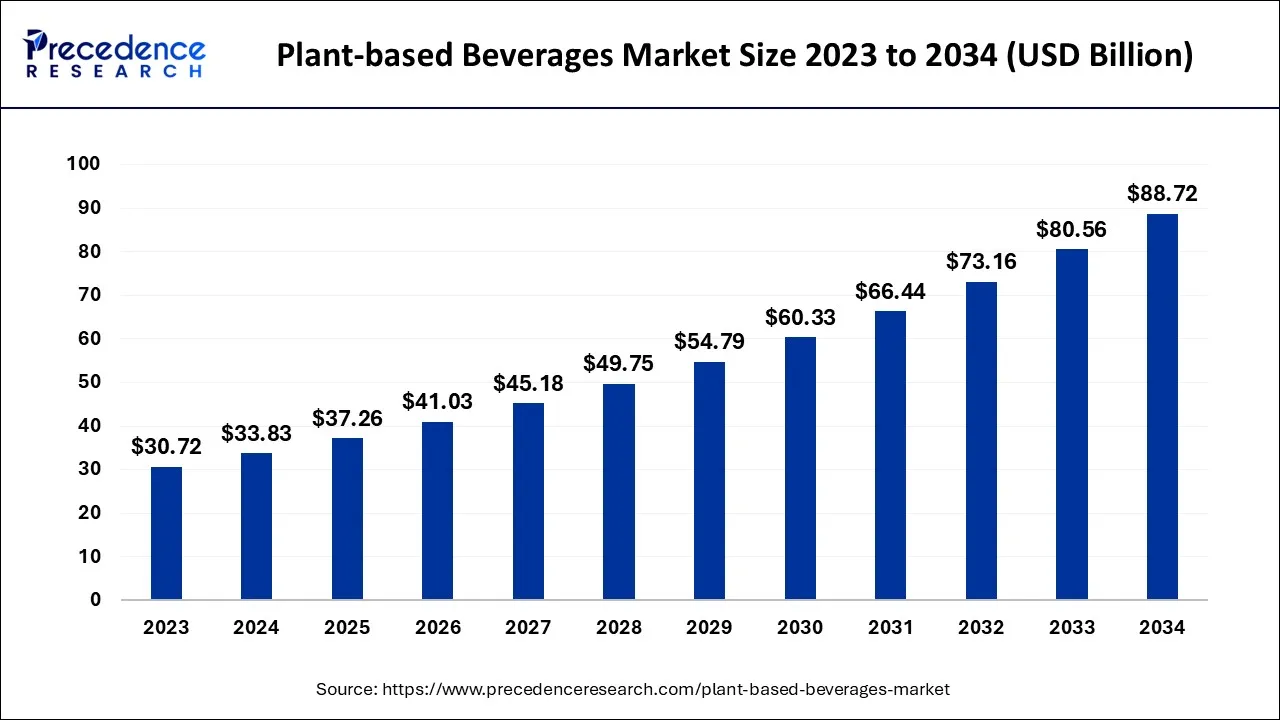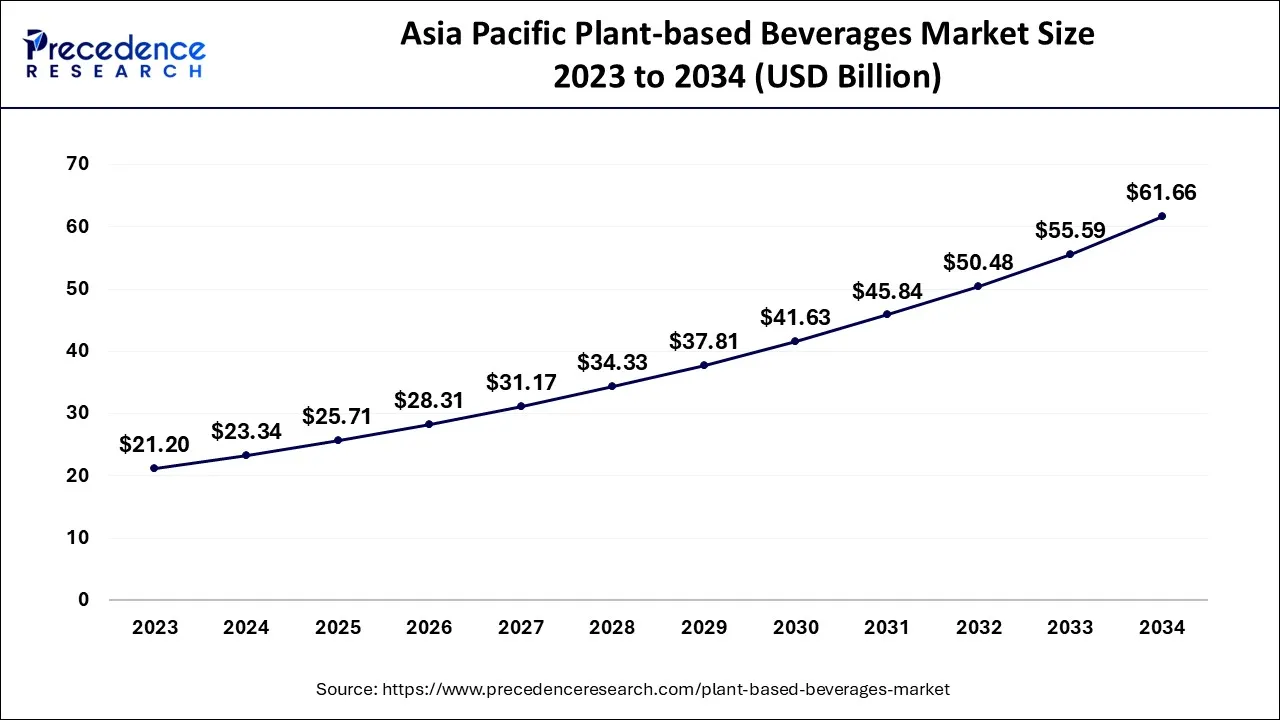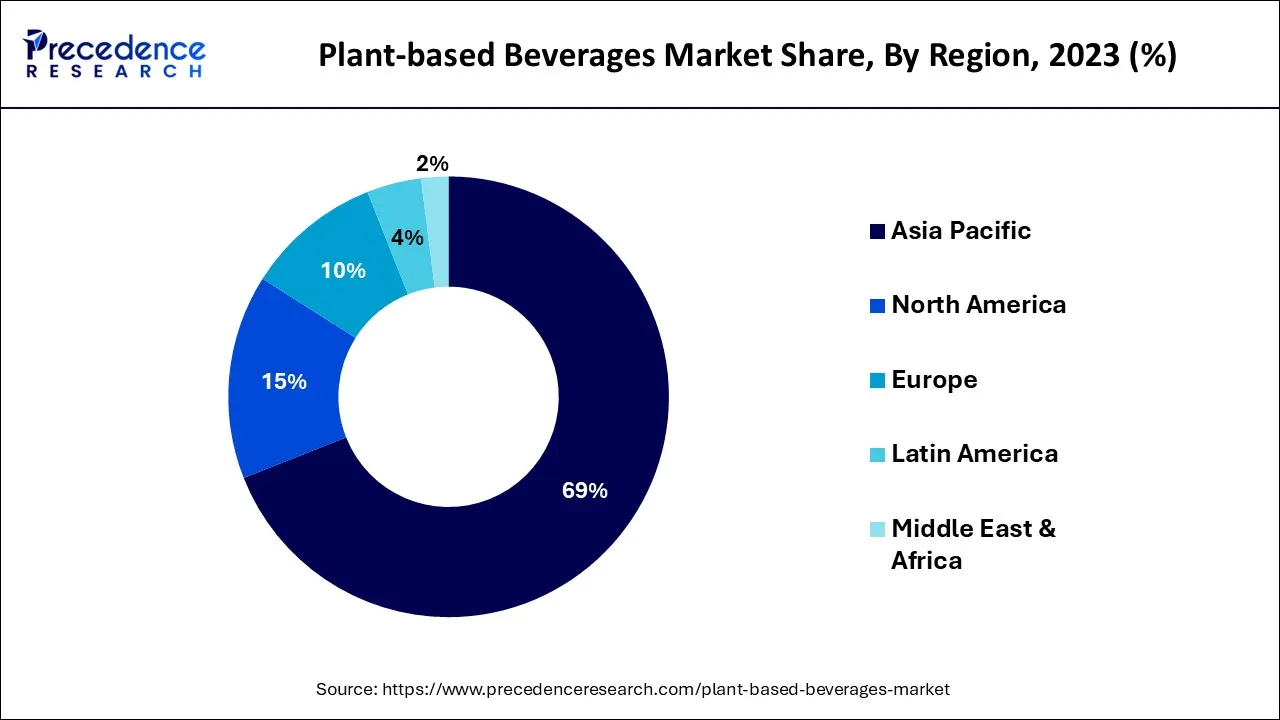Plant-based Beverages Market Size and Forecast 2025 to 2034
The global plant-based beverages market size is expected to be valued at USD 33.83 billion in 2024 and is anticipated to reach around USD 88.72 billion by 2034, expanding at a CAGR of 10.12% over the forecast period from 2025 to 2034.

Plant-based Beverages Market Key Takeaways
- In terms of revenue, the market is valued at $37.26 billion in 2025.
- It is projected to reach $88.72 billion by 2034.
- The market is expected to grow at a CAGR of 10.12% from 2025 to 2034.
- Asia Pacific has accounted for 69% of the overall revenue share in 2025.
- Europe is expected to grow at the fastest CAGR from 2025 to 2034.
- By source, the soy beverage segment accounted for the maximum revenue share of 38.6% in 2024. However, the coconut beverages segment is growing at the fastest CAGR between 2025 to 2034.
- By product, the plain beverages segment has generated a maximum revenue share of 70.4% in 2024. However, the flavored beverages segment is poised to grow at the fastest CAGR from 2025 to 2034.
Asia Pacific Plant-based Beverages Market Size and Growth 2025 to 2034
The Asia Pacific plant-based beverages market size is exhibited at USD 25.71 billion in 2025 and is projected to be worth around USD 61.66 billion by 2034, growing at a CAGR of 10.2% from 2025 to 2034.

The consumption of plant-based beverages was maximum in the Asia Pacific region. This trend shall continue in the coming years as the consumption of vegan diets is expected to grow. Health-conscious consumers in this region will drive market growth. The popularity of coconut milk and soy milk in various nations like Japan, India, and China is expected to grow. Coconut milk has great potential in the Asia Pacific region as coconut is a crop grown in these nations.

In Asia pacific region India, the Philippines, and Indonesia are the countries that are engaged in the production of coconut.
The plant-based beverages market in India is experiencing significant growth and the growth is driven by the increasing health consciousness with rising chronic diseases in the country due to unhealthy eating habits, environmental concerns, and a shift towards sustainable consumption and changing lifestyle and preferences of the consumers which demand for healthy and clean food and drinks, these factors drive the growth in the market.
The fastest compound annual growth rate will be registered in the European region due to the growing demand for nutrient-rich plant-based beverages. Government laws in the European nations are amended in a way that they support plant-based beverages. In the countries like Spain, the United Kingdom, and Germany many new products are being launched.
The Europe plant-bases beverages market is experiencing robust growth which is driven by the increasing consumer demand for healthier, sustainable and dairy free alternatives, to that of the traditional beverages having unhealthy derivatives, which drives the growth of the market in the region.
Market Overview
The beverages that are obtained from grains and seeds are known as plant-based beverages. Water is utilized as a vehicle for plant-based beverages. Many consumers who are lactose intolerant demand such plant-based beverages. These beverages are consumed by consumers as dairy substitutes.
Plant-based Beverages Market Growth Factors
- Increase in the disposable income of the middle-class population.
- Rapid urbanization has also led to the growth of the market.
- Growing awareness about animal cruelty will increase the sales of plant-based beverages
- Health-conscious consumers prefer plant-based beverages as they have no fat and zero lactose content.
- Plant-based beverages have zero cholesterol.
- Plant-based beverages reduce carbon footprints and it is a sustainable option.
Increasing cases of lactose intolerance are one of the leading causes of the growing market value of plant-based beverages across the world. It is expected to provide maximum growth in the coming years. Consumers that seek no cholesterol and no fat options will prefer these products. Plant-based beverages are seen as a healthy option available in the market which provides crucial minerals and vitamins to the consumer.
Widely available options for consumption are soy milk, almond milk, and rice milk. The awareness regarding animal cruelty has also increased and various awareness drives conducted across the globe have played a significant role in increasing the consumption of cruelty-free products. Youngsters prefer plant-based beverages as compared to the elder group as found in a survey conducted by the British nutrition foundation.
Rapid urbanization and increasing disposable income are some of the other factors playing an instrumental role in the growth of the plant-based beverages market. This is the healthiest alternative available in the market for dairy products. Plant-based milk products will show significant growth during the forecast period. Plant-based beverages are a sustainable option that is promoted to a great extent as it also helps in reducing carbon footprints.
The growing popularity of vegan diets will also lead to increased consumption of plant-based beverages. These beverages have high nutritional value, and this will play a significant role in the growth of the market.
Market Scope
| Report Coverage | Details |
| Market Size by 2034 | USD 88.72 Billion |
| Market Size in 2025 | USD 37.26 Billion |
| Market Size in 2024 | USD 33.83 Billion |
| Growth Rate from 2025 to 2034 | CAGR of 10.12% |
| Base Year | 2024 |
| Forecast Period | 2025 to 2034 |
| Segments Covered | Source, Type, Product, Distribution Channel, Function and Region |
| Regions Covered | North America, Europe, Asia-Pacific, Latin America and Middle East & Africa |
Market Dynamics
Drivers
Growing prevalence of lactose intolerance
- Increasing cases of people suffering from intolerance to lactose are linked to the growth of the plant-based beverages market. Dairy allergy is yet another reason that is likely to increase the sales of plant-based beverages. Growing disposable income and increasing health consciousness will expand the market.
Vegan diets are gaining popularity
- Many people across the globe are adopting vegan diets and this is expected to increase the consumption of plant-based beverages. The demand for plant-based beverages is expected to grow exponentially in the Asia Pacific nations.
Growing awareness about these products
- Nutrition labels indicate the value of these products to a great extent and growing awareness among consumers is expected to increase the choice of healthier options. The availability of various brands in the market providing plant-based beverages will also play a significant role in the growth of the market.
Restraints
Cost of research and development
- Exorbitant investment is needed for research and development purposes to come up with new products in the market and this happens to be a major restraint in the growth of the market, especially for medium-sized companies.
Absence of standardization
- Plant-based beverages like probiotics may have several side effects if consumed by patients and the absence of proper guidelines will hamper the market in the long run. The manufacturing procedure and processes need to have strict regulations to have a better hold in the market.
Opportunities
Increasing preference for milk alternatives
- About 45% of the population in the United States depends on alternatives for milk which is a dairy product, and this happens to be a major ground for the growth of the plant-based beverages market. This trend is expected to continue in the coming years, and it is expected to gain popularity in other regions of the world. Nations like China, Japan, and India are seen as potential markets that are anticipated to show faster growth in the coming times. As the consumer lifestyle in these nations has evolved and the accessibility to such products has increased, the market is expected to grow.
The development of novel products will stimulate the market growth
- The essential nutrient content in the products that are plant-based is high. The taste of these products is also identical to the products derived from animals. Athletes and celebrities are engaged in promoting the consumption of plant-based food products and beverages which help in maintaining good health. The easy availability of these products through various channels will drive market growth in the coming years.
Challenges
Expensive products are available in the market
- Widely available plant-based products in developing as well as developed nations across the globe are expensive in nature as the raw materials used in the production of these beverages have fluctuating prices, these factors will hamper the market growth in the long run. The climatic conditions also have a major impact on the growth of the crops and all these conditions will hamper the production of plant-based beverages.
Type Insights
The plant-based milk segment is expected to generate maximum revenue during the forecast period. Cases of lactose intolerance have grown in recent times across the world due to which the reward for plant-based milk has increased. Coconut milk and soy milk are plant-based beverages that provide good dietary benefits. Beverages that are healthy and nutritional have a greater demand in the market across the globe.
Apart from the growth of the plant-based milk segment, the juices segment is also expected to grow at a higher compound annual growth rate in the coming years. The growing popularity of vegan diets has increased the consumption of vegetables. The consumption of juices and smoothies has grown especially among health-conscious consumers. Many companies that are engaged in the production of fruit juices have also set their production line for vegetable juices by providing good flavors through the traditional process.
Source Insights
Based on source type, soy-based beverages have been the highest contributor to the growth of the market in recent times. There are many health advantages associated with the consumption of these beverages due to which this product is gaining popularity across the world. Soy-based beverages contain potassium, vitamin A, vitamin B12, and protein in abundance. This happens to be the best option available in the market for people that are lactose intolerant.
Growing demand for different kinds of plant-based beverages has increased the research and development procedures for the introduction of new products in the market. As the source of soy milk is plant it is a low-fat and cholesterol-free option. The potassium content in these beverages is high and it also contains high amounts of calcium. Compared to cow's milk, soy milk contains fewer calories.
The segment of coconut-based beverages is also expected to show significant growth in the coming years. The content of electrolytes in coconut-based beverages makes them good sports beverages. The absence of artificial sweeteners and sugar in coconut water has created more demand for these beverages. Juice and soda contain high amounts of calories and they can be easily replaced with coconut water. People suffering from nut allergies can also consume these coconut-based beverages without any hassles.
Distribution Channel Insights
The supermarkets and the hypermarket segment are expected to have the largest market share. A variety of options offered in the supermarkets is expected to drive sales to a great extent. In the majority of developed nations, different products are offered in supermarkets and hypermarkets. Dedicated shelf space for these products and the availability of various brands will have a positive impact on the market growth.
The consumption of plant-based beverages has increased in recent times, especially after the outbreak of the COVID-19 pandemic and the sales of these products through online stores have increased to a great extent. Regular consumers of these products prefer purchasing beverages from specialty stores in their locality.
Plant-based Beverages Market Companies
- Bayer AG
- Abbott
- DSM
- DuPont.
- Amway
- The Nature's Bounty Co.
- GlaxoSmithKline plc.
- Nestlé SA
- RiceBran Technologies
- Mead Johnson & Company, LLC.
- Medifast, Inc.
- Premier Nutrition Corporation
- TOOTSI IMPEX Inc.
- U.S. Spice Mills, Inc.
- Health Food Manufacturers' Association
- NOW Foods
- Glanbia PLC
- Herbalife International of America, Inc.
- Bionova
Recent Development
- In May 2025, Prodotti Rubicone, a renowned Italian company known for its gelato and pastry ingredients, introduced two new acai-based products: Top Fruit Acai concentrated paste and Soft Acai powder. These products are crafted to meet rising demand for natural and functional food ingredients and are suitable for artisanal gelato, soft-serve, smoothies, and milkshakes.
- In October 2024, Whole Moon unveiled a line of plant-based beverages that offer complete protein through a proprietary process using whole-roasted almonds, oats, pistachios, and soybeans. The resulting drinks feature a rich, nutty taste and full-bodied texture, providing essential nutrients with less waste while delivering all nine essential amino acids.
- In August 2024, start-up brand 1.5 Degree launched a broad range of plant-based frozen desserts and beverages, responding to increasing interest in dairy alternatives. Their offerings include oat and soy milk, flavored milkshakes, cold coffee, and gelato in distinctive flavors like paan, Biscoff, and mocha almond fudge, all designed to be tasty, healthy, and lactose-free
- Starbucks had announced specialty drinks that will make use of plant-based milk to expand its lineup of vegan products. Drinks and beverages that are vegan are added to this brand like the Shaken Espresso drink and Ice Toasted Vanilla Oat Milk.
- A soy-based version of Milo was launched by Nestle which is one of the most favorite beverages consumed across the world.
- In 2021 vegan lassi was launched by Plant Veda which is a company based in Vancouver. This lassi will be made from real fruits and cashew nuts. This beverage will contain probiotics and it will be free from cane sugar.
- Plant-based milk was launched by Heartbeat in 2021 which is a Mexican company. Plain flavor and quinoa flavor will be offered in this sugar-free milk.
Segments Covered in the Report
By Source
- Coconut
- Soy
- Almond
- Rice
- Oats
- Hemp
- Others
By Type
- Plant-based Milk
- Juices
- Tea and Coffee
- Others
By Product
- Plain
- Flavored
By Distribution Channel
- Hypermarkets and Supermarkets
- Specialty Stores
- Online Stores
- Others
By Function
- Sauce & Dressing
- Carbonated Soft Drink
- Cardiovascular Health
- Cancer Prevention
- Lactose Intolerant
- Bone Health
By Region
- North America
- Europe
- Asia-Pacific
- Latin America
- The Middle East and Africa
For inquiries regarding discounts, bulk purchases, or customization requests, please contact us at sales@precedenceresearch.com
Frequently Asked Questions
Ask For Sample
No cookie-cutter, only authentic analysis – take the 1st step to become a Precedence Research client
 Get a Sample
Get a Sample
 Table Of Content
Table Of Content
 sales@precedenceresearch.com
sales@precedenceresearch.com
 +1 804-441-9344
+1 804-441-9344
 Schedule a Meeting
Schedule a Meeting